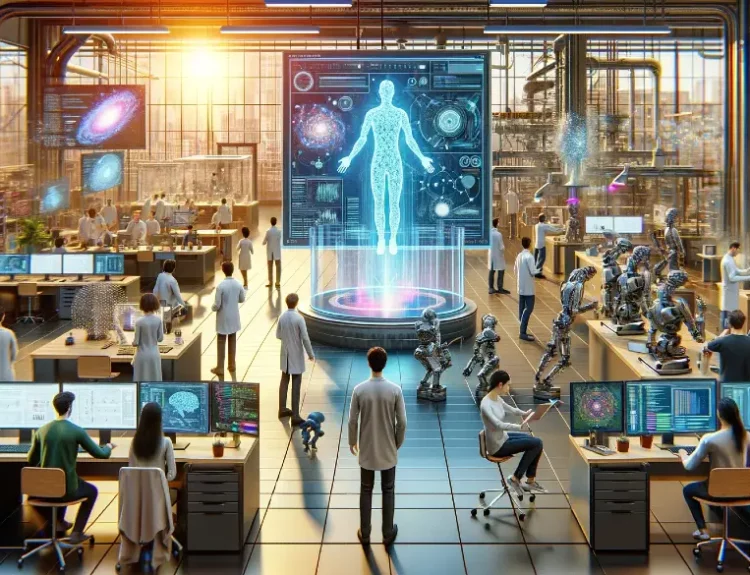Introduction
The information age has brought an explosion of data at our fingertips. From scientific journals to social media posts, the sheer volume of knowledge available can be overwhelming. Finding the specific answers we need can feel like searching for a needle in a haystack. This is where AI-powered computers step in, revolutionizing the way we interact with information.
These intelligent systems, powered by Artificial Intelligence (AI), are designed to understand and respond to our questions in a natural way. Forget sifting through endless search results – AI can analyze vast amounts of data, pinpoint the most relevant information, and deliver clear, concise answers in a fraction of the time. This not only saves us valuable time but also ensures we’re getting the most accurate and up-to-date information available.
The Rise of AI-Driven Question-Response Systems
The days of keyword-based search and frustratingly irrelevant results are fading. AI-driven question-response systems are emerging as the future of information retrieval, offering a more intuitive and user-friendly way to find answers. These intelligent systems are built on the foundation of Natural Language Understanding (NLU), a branch of AI that allows computers to process and comprehend human language.
At the heart of these systems lie powerful AI algorithms, particularly those utilizing Machine Learning and Deep Learning techniques. Machine Learning algorithms learn from vast amounts of text data, enabling them to identify patterns and relationships within language. This allows them to understand the intent behind a user’s question, even if it’s phrased differently than what the system has seen before. Deep Learning takes this a step further by using complex neural networks modeled after the human brain. These networks can process and analyze even more intricate aspects of language, including context and nuance, leading to a more sophisticated understanding of user queries.
The advancements in NLU have paved the way for innovations in AI-powered query solutions. These systems can now not only understand simple factual questions but also handle complex inquiries that require reasoning and analysis. Additionally, the rise of conversational interfaces makes interacting with these systems even more natural. Imagine having a virtual assistant that can answer your questions in a back-and-forth dialogue, just like you would with a human expert. This shift towards conversational interfaces further enhances the user experience and makes accessing information an intuitive and engaging process.
The Power of AI in Information Retrieval
The traditional methods of information retrieval, relying on keyword matching, often produced a flood of irrelevant results. AI-powered systems, however, revolutionize this process by harnessing the power of AI in several key ways.
Firstly, AI excels at understanding user intent. Unlike keyword-based search, which focuses on the literal meaning of words, AI algorithms analyze the context and meaning behind a user’s question. This allows them to identify the true information need, even if it’s not explicitly stated. Imagine searching for “best pizza places near me” – an AI system understands you’re looking for recommendations, not just a list of all pizzerias.
Secondly, AI empowers faster and more accurate responses. By analyzing massive datasets and identifying the most relevant information, AI can deliver answers in a fraction of the time it takes to sift through traditional search results. Additionally, AI’s ability to learn and adapt continuously improves the accuracy of its responses over time.
Finally, AI opens doors to handling complex queries. Gone are the days of struggling to formulate the perfect search string. AI systems can handle intricate questions that require reasoning and analysis. Need to compare the environmental impact of different travel options? An AI system can analyze data on carbon footprint, travel time, and other factors to provide a comprehensive answer.
The impact of AI in information retrieval extends beyond just search engines. Virtual assistants like Siri and Alexa leverage AI to answer your questions in a natural and conversational way. The future holds even greater possibilities, with AI-powered systems seamlessly integrated into various aspects of our lives, providing instant and insightful answers on demand.
Enhancing Responses with Cutting-Edge AI Technology
AI doesn’t just provide answers; it personalizes and enriches the way we receive them. Imagine a research assistant that tailors its responses to your specific interests and knowledge level. This is the power of AI in enhancing responses.
Cutting-edge AI technology goes beyond simply delivering factual information. By analyzing user data and past interactions, these systems can personalize responses to cater to your unique needs. For instance, an AI system might present complex topics in a simplified manner for a beginner and delve into deeper details for a more experienced user.
Furthermore, advanced AI systems are pushing the boundaries of answer generation. Gone are the days of dry, one-sentence responses. AI can now generate comprehensive and informative answers that incorporate evidence, provide context, and even offer different perspectives on a topic.
However, it’s important to acknowledge that AI technology is still under development. While impressive strides have been made, some limitations remain. Understanding complex, subjective questions or humor can still be a challenge for AI systems. Researchers are actively working on these limitations, and with continued advancements, AI’s ability to understand and respond to human language will become increasingly sophisticated.
Conclusion
The future of information retrieval is undeniably intertwined with AI. As AI-powered question-response systems continue to evolve, they promise to revolutionize the way we access and interact with knowledge. Imagine a world where finding the answers you need is effortless and intuitive, where AI becomes your intelligent companion in the pursuit of knowledge.
This exciting future is being shaped by platforms like Verdict. At Verdict, we’re building an AI that learns and grows with every interaction, constantly expanding its understanding of the world. By joining our community and engaging with Verdict, you’re not just getting answers – you’re contributing to the development of an AI that reflects our collective intelligence .
And for those who want to delve deeper into the fascinating world of AI, be sure to explore our blog page! We have a wide range of informative and engaging articles, covering topics like “A Journey through AI’s History in Computing” and “AI Computer Systems Driving Innovation.” With new content added regularly, there’s always something new to discover
Join us on this journey of exploration and innovation, and let’s unlock the full potential of AI.










